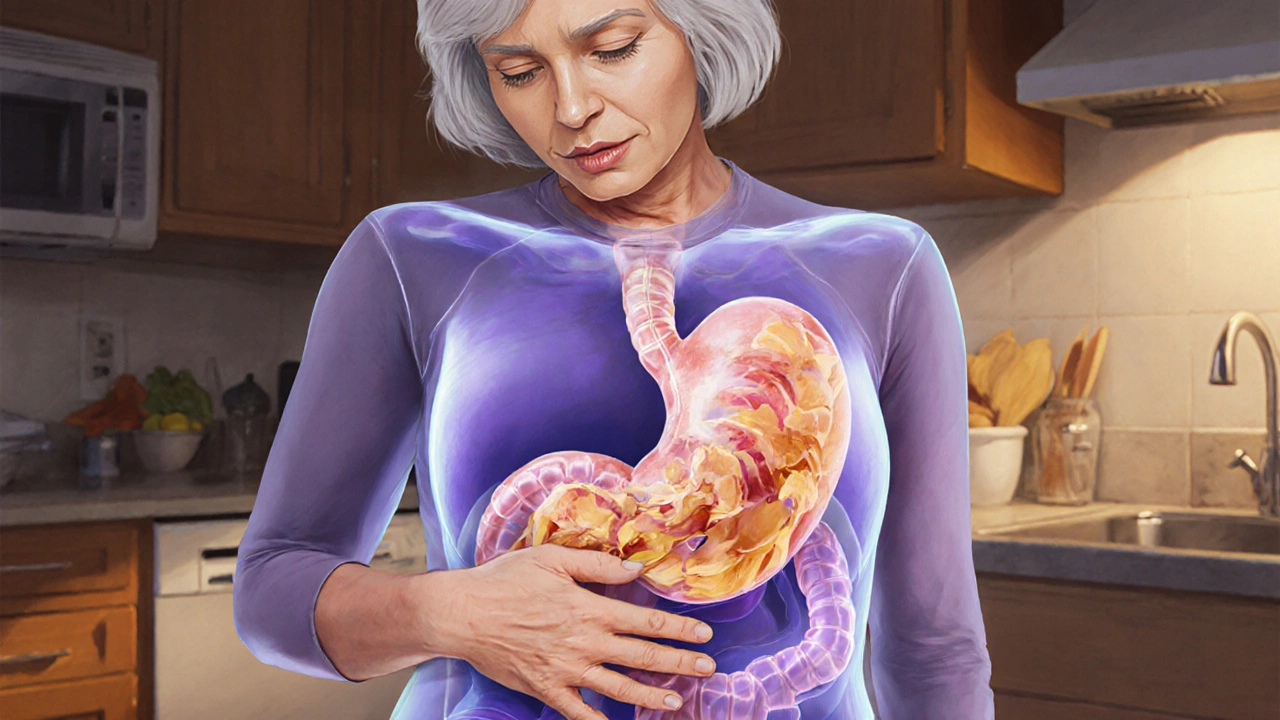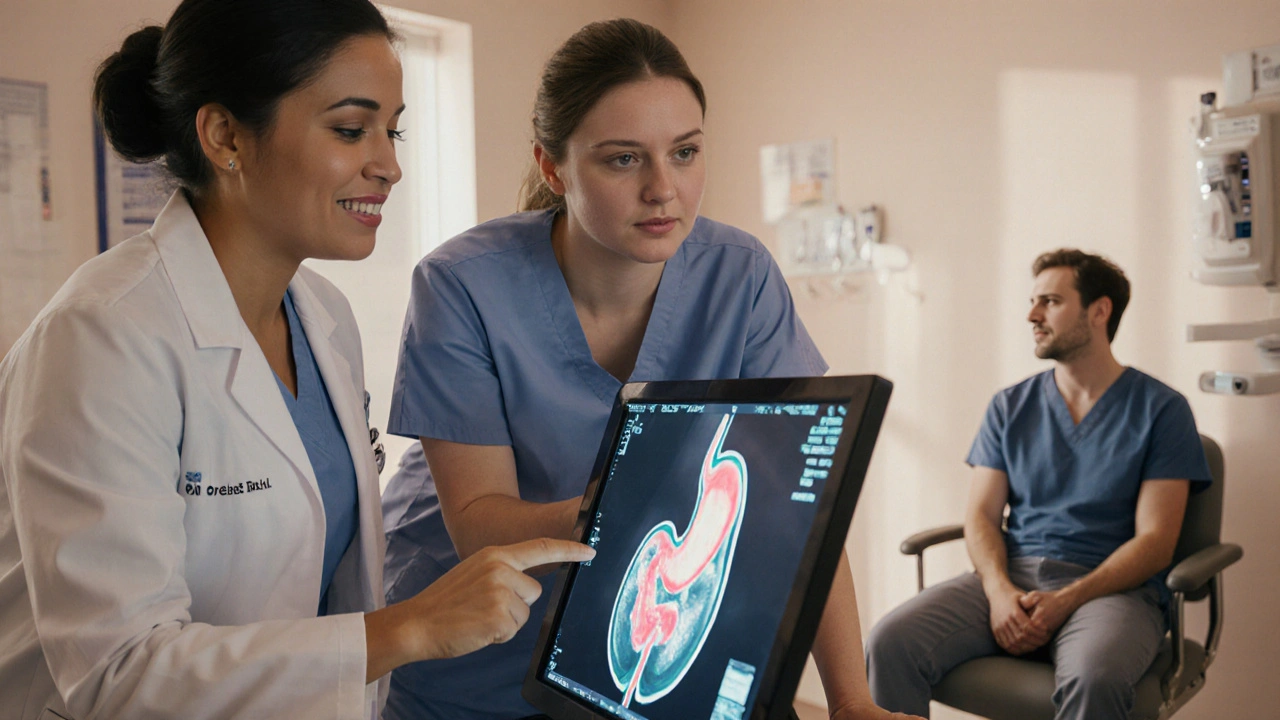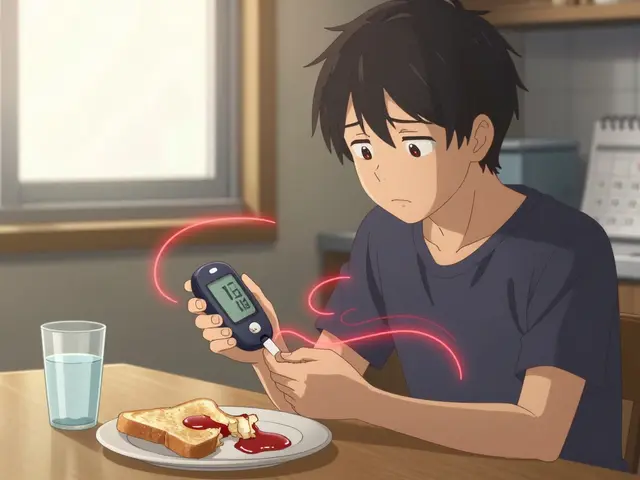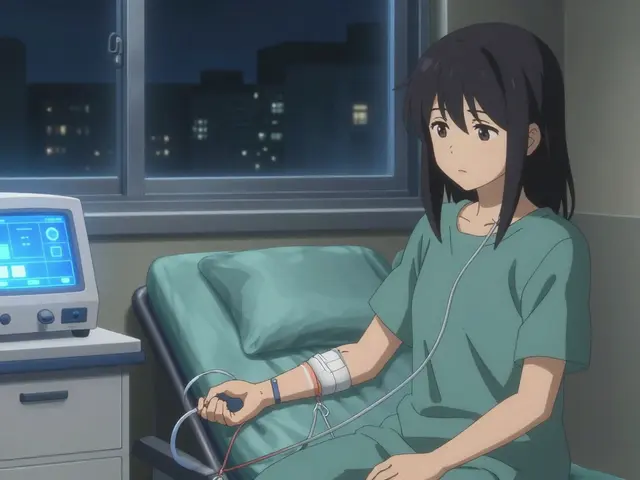Diabetic Gastroparesis Carbohydrate Tracker
This tool helps estimate daily carbohydrate intake and provides recommendations for managing blood sugar with gastroparesis.
- Consider eating smaller, more frequent meals.
- Avoid high-fat and high-fiber foods.
- Monitor blood glucose regularly after meals.
- Consult your healthcare provider about meal timing and insulin adjustments.
Imagine feeling full after just a few bites, your stomach refusing to move food, and your blood sugar swinging wildly. For millions of people with diabetes, that’s the daily reality of diabetic gastroparesis-a condition that demands teamwork between two specialists.
What Is Diabetic Gastroparesis?
Diabetic gastroparesis is a chronic delay in stomach emptying caused primarily by diabetes‑related nerve damage. When the stomach muscles don’t contract properly, food sits in the upper digestive tract longer than normal, leading to bloating, nausea, and unpredictable blood‑glucose spikes.
Why It Happens: The Diabetes Connection
Diabetes mellitus is a metabolic disorder characterized by high blood‑sugar levels due to insufficient insulin production or action. Over time, uncontrolled blood sugar can damage the autonomic nerves that control the stomach - a condition known as autonomic neuropathy nerve damage that impairs the muscles of the gastrointestinal tract. This neuropathy is the primary driver behind the sluggish gastric motility seen in diabetic gastroparesis.
Spotting the Signs: Common Symptoms
Patients often report a mix of the following:
- Early satiety - feeling full after a few bites
- Persistent nausea or vomiting, especially after meals
- Bloating and abdominal pain
- Fluctuating blood‑glucose readings that don’t match food intake
- Unexplained weight loss
Getting a Diagnosis: Tests & Assessments
Because symptoms overlap with other GI disorders, a structured work‑up is essential.
- Medical history review focusing on diabetes duration and control.
- Physical examination to assess abdominal distention.
- Laboratory tests to rule out metabolic causes.
- Gastric emptying scintigraphy is the gold‑standard test, measuring how quickly a radiolabeled meal leaves the stomach over a two‑hour period. Delayed emptying beyond 60% retention at two hours confirms gastroparesis.
- Upper endoscopy may be performed to exclude obstruction.
The Gastroenterologist’s Playbook
Gastroenterologists specialize in diseases of the digestive system and take the lead on evaluating and managing gastric motility disorders. Their typical interventions include:
- Prescribing prokinetic medications such as metoclopramide or erythromycin to stimulate stomach contractions.
- Recommending antiemetic drugs for severe nausea.
- Conducting repeat gastric emptying studies to monitor treatment response.
- Coordinating advanced therapies like gastric electrical stimulation for refractory cases.

The Endocrinologist’s Playbook
Endocrinologists focus on hormonal regulation, with diabetes management as their core expertise. Their role in gastroparesis revolves around optimizing blood‑glucose control, which directly influences gastric motility.
- Adjusting insulin regimens to account for delayed nutrient absorption.
- Implementing continuous glucose monitoring (CGM) to detect rapid swings.
- Educating patients on carbohydrate counting in the context of slower gastric emptying.
- Collaborating with dietitians to create low‑fat, low‑fiber meals that empty more quickly.
Coordinated Care: How the Two Specialists Work Together
Effective management hinges on clear communication between the gastroenterologist and the endocrinologist. A typical workflow looks like this:
- The gastroenterologist confirms delayed gastric emptying and starts a prokinetic.
- The patient’s endocrinologist reviews the new medication’s impact on blood glucose and adjusts insulin doses accordingly.
- Both doctors share progress notes-often via an electronic health record-so that dosage changes are synchronized.
- Regular multidisciplinary meetings allow the team to tweak diet, medication, and monitoring plans based on symptom logs.
This collaborative model reduces hospitalizations, improves nutritional status, and steadies glucose control.
Practical Tips for Patients
Here’s a checklist you can take to your next appointment:
- Bring a 3‑day food and symptom diary, noting timing of meals, nausea, and glucose readings.
- List all current medications, including over‑the‑counter and herbal supplements.
- Ask about the timing of insulin relative to meals-many specialists recommend splitting doses or using rapid‑acting analogs.
- Discuss meal size: aim for smaller, more frequent meals that are low in fat and fiber.
- Inquire whether a gastric emptying study is warranted if you haven’t had one in the past year.
Role Comparison: Gastroenterologist vs. Endocrinologist
| Aspect | Gastroenterologist | Endocrinologist |
|---|---|---|
| Primary focus | Stomach motility, diagnostic testing, prokinetic therapy | Blood‑glucose control, insulin adjustment, hormonal balance |
| Core procedures | Gastric emptying scintigraphy, endoscopy, gastric electrical stimulation | CGM interpretation, insulin pump programming, endocrine labs |
| Medication expertise | Prokinetics, antiemetics | Insulin analogs, oral hypoglycemics, adjunctive agents |
| Dietary guidance | Low‑fat, low‑fiber meals, timing strategies | Carbohydrate counting, glycemic index awareness |
| Follow‑up frequency | Every 3-6months, or after therapy changes | Every 1-3months, especially after medication tweaks |
Next Steps for Care
If you suspect gastroparesis, start by scheduling a visit with your primary care physician to get a referral to a gastroenterologist. Simultaneously, ensure your endocrinologist is aware of the new GI symptoms so they can begin adjusting your diabetes plan. Early intervention can prevent malnutrition and keep your glucose levels stable.
Frequently Asked Questions
Can diabetic gastroparesis be cured?
There is no permanent cure, but symptoms can be dramatically improved with combined medication, dietary changes, and tight blood‑glucose control.
How long does a gastric emptying study take?
The test itself lasts about 30minutes, but you’ll need to stay for the full two‑hour observation period to capture delayed emptying data.
Do prokinetic drugs affect blood sugar?
Most prokinetics have minimal direct impact on glucose, but faster gastric emptying can change how quickly carbs enter the bloodstream, so insulin doses may need tweaking.
Is surgery ever needed?
Surgery is rare and reserved for severe, refractory cases. Options include gastric electrical stimulation or, in extreme situations, a feeding tube.
What lifestyle changes help most?
Eating smaller meals, avoiding high‑fat foods, staying hydrated, and using CGM to track glucose trends are the top strategies.




People who ignore the gut‑brain link are basically selfish they think meds alone will fix gastroparesis 😒
Oh the tragedy of a stomach that refuses to obey! It's like a cruel joke from fate itself
Managing diabetic gastroparesis feels like a marathon, but each small step counts.
Start by logging every bite, even the tiny snacks, because carbs can linger longer than you think.
Use a low‑fat, low‑fiber diet – think boiled chicken, plain rice, and steamed veggies rather than fried foods.
Spread those meals into six‑to‑eight tiny portions throughout the day; your stomach will thank you.
Pair each meal with a rapid‑acting insulin analog and monitor the CGM closely – you’ll spot trends quicker.
If nausea spikes, a short course of metoclopramide can help, but keep the doctor in the loop.
Consider a gastric emptying scintigraphy every six months to gauge progress.
Don’t forget hydration – clear soups and electrolyte drinks aid motility.
When you’re feeling good, reward yourself with a gentle walk; light activity can improve gastric transit.
Keep a symptom diary: note bloating, nausea, and blood‑sugar swings side by side.
Share that diary at every appointment; data drives better treatment adjustments.
Ask your gastroenterologist about gastric electrical stimulation if meds fail – it’s a viable option for refractory cases.
Work with a dietitian to fine‑tune your carb counting, especially since carbs may hit the bloodstream later.
Stay patient – improvements can be gradual, but coordinated care really does make a difference.
Lastly, lean on support groups; hearing others’ tricks can spark new ideas for your own routine.
For anyone starting, the first step is to get a gastric emptying study – it’s the gold standard for diagnosis and guides treatment.
Think of the diet as a cultural roadmap; low‑fat, low‑fiber foods are like smooth highways for your stomach to travel.
Don’t forget to sync your CGM data with meal times – it reveals patterns that even doctors might miss 😊
Ask your gastroenterologist if gastric electrical stimulation is an option – it can help when meds fail.
The literature suggests that prokinetics have a modest effect size; any claim of miraculous cure is scientifically unfounded.
Track carbs, track symptoms, track results.
Proofreading your symptom diary before a visit can save both you and your doctor time 📋
i've seen patients do better when they spread meals out over 6‑8 small portions each day.
The real issue is patients often overlook the impact of high‑fat meals on gastric motility.
Remember, small consistent changes beat occasional big overhauls – stay patient and keep logging.
It’s easy to feel defeated when nausea strikes after every bite, but you’re not alone.
Your endocrinologist can adjust rapid‑acting insulin to match slower carb absorption.
Meanwhile, a dietitian can tailor low‑fat meals that still satisfy cravings.
Keep a simple three‑day log of what you ate, the timing, and any symptoms.
Share that log at your next appointment; concrete data drives better decisions.
Don’t hesitate to ask for a repeat gastric emptying study if your symptoms persist.
Mental health matters too – stress can worsen motility, so consider gentle relaxation techniques.
You have a team behind you, and coordinated care really does improve outcomes.
From a GI standpoint, optimizing gastric emptying kinetics reduces postprandial glycemic excursions – a win‑win for metabolic control.
Spice up your plate with ginger and peppermint they’re natural motility boosters 🌿
Some pharma trials hide the fact that long‑term prokinetic use can lead to tachyphylaxis – read between the headlines.
By the way, have you tried pacing your insulin pump deliveries to align with smaller, frequent meals? It’s a game changer.
Honestly the whole “just eat less fat” advice is oversimplified many patients need nuanced macronutrient timing.
While guidelines endorse prokinetics, real‑world evidence shows many patients derive limited benefit.